Amon Goeth, Plaszow Commandant
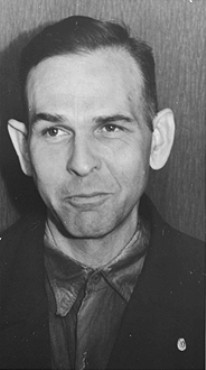 Amon Goeth, Commandant
of Plaszow
Amon Goeth, Commandant
of Plaszow
The photo above shows the Commandant
of the Plaszow camp, Amon Leopold Goeth (Göth), after he
was arrested by the SS Criminal Police for "corruption and
brutality" on September 13, 1944 and imprisoned at Breslau.
Amon Leopold Goeth, the villain of the
movie Schindler's List, was born in 1908 in Vienna, Austria.
At the age of 24, he joined the Nazi party. In
1940, Amon Goeth became a member of the Waffen-SS. He was assigned
to the SS headquarters for Operation Reinhard in Lublin in German-occupied
Poland in 1942. Operation Reinhard was the plan to evacuate the
Jews from the Ghettos in Poland to three death camps: Treblinka,
Sobibor and Belzec, all of which were in eastern Poland. Goeth's
first task was supervise the liquidation of several of the small
ghettos in Lublin.
The Jewish ghettos in Lublin were the
first to be liquidated and some of the Jews from Lublin were
the first to be sent to the Belzec extermination camp during Operation Reinhard, which marked the beginning of the "Final Solution of the Jewish Question in Europe." Goeth accepted bribes from some of the Lublin ghetto Jews during the selection process, and put them on the list to be sent to a labor camp, rather than to the Belzec death camp.
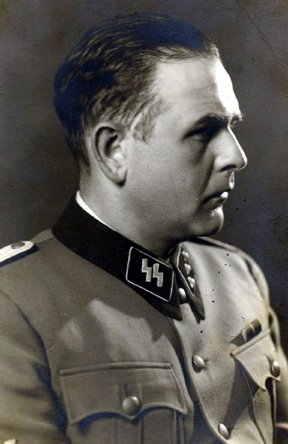 Amon Goeth in his SS
uniform
Amon Goeth in his SS
uniform
The photo above shows Amon Goeth before his health deteriorated. After he was arrested and imprisoned by the SS, he was diagnosed with Type-2 diabetes and sent to an SS sanitarium at Bad Tölz in Germany.
In February 1943, Goeth received a promotion
and became the third SS officer to hold the job of Commandant
of the Plaszow labor camp. While he was the Commandant of Plaszow,
Goeth was assigned to supervise the liquidation of the Podgorze
ghetto on March 13, 1943, and later the labor camp at Szebnie.
The liquidation of the Podgorze ghetto in Krakow is shown in
the movie, Schindler's List. The ghetto scenes in the movie were
filmed in Kazimierz,
another ghetto in Krakow.
On September 3, 1943, Goeth supervised
the liquidation of the Tarnow ghetto. During the liquidation
of these ghettos, Goeth took advantage of the situation by stealing
some of the property that was confiscated from the Jews, including
furs and furniture. He stored some of this property in an apartment
in Vienna, where his wife lived with his two children.
In January 1944, the forced labor camp
at Plaszow was converted into a concentration camp under the
jurisdiction of WVHA, the SS Office of Economics and Administration
in Oranienburg, near Berlin. The two sub-camps at Prokocim and
Biezanow were incorporated into the main camp at Plaszow and
living conditions were improved. The Polish prisoners and a few
German criminals were now in the same camp as the Jews, as was
typical in other Nazi concentration camps. Only a few prisoners
were now required to work in the quarry as punishment. There
were factories set up for the production of Wehrmacht (regular
Germany army) uniforms and for upholstered furniture. There was
also a custom tailoring shop, a jewelry shop and a cable factory
in the camp.
As the Commandant of the Plaszow concentration
camp, Amon Goeth now had to report to the WVHA headquarters office
in Oranienburg.
The following quote is from the novel
Schindler's List:
"The chiefs in Oranienburg did
not permit summary execution. The days when slow potato-peelers
could be expunged on the spot were gone. They could now be destroyed
only by due process. There had to be a hearing, a record sent
in triplicate to Oranienburg. The sentence had to be confirmed
not only by General Glueck's office but also by General Pohl's
Department W (Economic Enterprises)."
After Goeth was arrested on September
13, 1944, Oskar Schindler was arrested a few days later and interrogated
by the SS as part of the Goeth investigation, according to David
Crowe's book entitled "Oskar Schindler." Crowe wrote
that Schindler "did move a lot of the former Plaszow commandant's
war booty to Brünnlitz. Göth, who still seemed to consider
Schindler his friend, visited Brünnlitz several times during
the latter months of the war while on parole."
David Crowe wrote that Amon Goeth had
been arrested after a 6-month investigation of Goeth's tenure
as Plaszow's Commandant. Goeth was kept in prison in Breslau
until he was released on parole on October 22, 1944 because he
was suffering from diabetes. He was recuperating in an SS sanitarium
in Bad Tölz near Munich when he was arrested by General
Patton's troops in 1945. His mistress, Ruth Irene Kalder, was
with him at Bad Tölz and their daughter, Monika, was born
there in November 1945. Goeth's second wife had divorced him
in 1944.
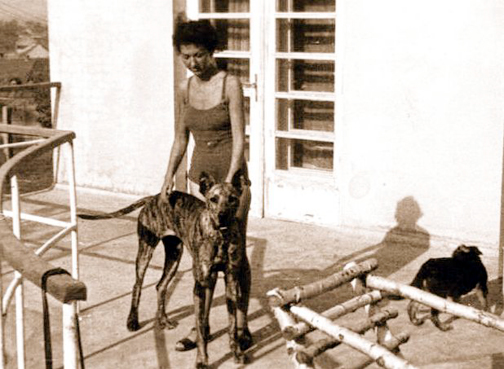 Ruth-Irene Kalder on
the balcony of Goeth's villa at Plaszow camp
Ruth-Irene Kalder on
the balcony of Goeth's villa at Plaszow camp
According to the novel, "Schindler's
Ark," Amon Goeth was "selling a percentage of the prison
rations on the open market in Cracow through an agent of his,
a Jewish prisoner named Wilek Chilowicz, who had contacts with
factory managements, merchants and even restaurants in Cracow."
Actually, this was only a small part of the corruption discovered
by the SS during their investigation of Amon Goeth.
In his novel entitled "Schindler's
Ark," Thomas Keneally explained that Chilowicz was allegedly
killed by Goeth because he was a potential witness to Goeth's
crime of stealing the prisoner's food. The prisoners didn't starve
however, because they brought stolen food into the camp with
them when they came back from work parties, according to the
author of Schindler's Ark. The movie shows a scene where Goeth
is trying to find out which prisoner brought a stolen chicken
into the camp.
Mietek Pemper, a prisoner at Plaszow
who worked as Goeth's stenographer and was privy to secret SS
documents, was the main witness against Amon Goeth when he was
put on trial in Poland after the war. Pemper told author David
Crowe that "the basis of Chilowicz's wealth came from the
goods that Göth had collected from Krakow's Jews after the
closing of the (Podgorze) ghetto. Though Göth was supposed
to send these valuables to the Reichsbank, he told Chilowicz
to keep most of it for his (Göth's) own expenses. These
goods became the basis of Göth's black market empire at
Plaszow. Chilowicz, who handled Göth's black market deals,
always managed to skim something off the top for himself."
According to David Crowe's book, Wilek
Chilowicz was the head of the OD, the Jewish police at Plaszow.
He wrote that "Göth sought permission to murder Chilowicz
and several other prominent OD men in the camp on false charges."
In all the Nazi concentration camps, the staff had to get permission
from headquarters in Oranienburg to punish a prisoner, but punishment
did not include murder.
Dr. Georg Konrad Morgen was a Waffen-SS
officer and attorney whom Reichsführer-SS Heinrich Himmler
had put in charge of investigating murder, corruption and mistreatment
of prisoners in all the Nazi concentration camps in 1943. Dr.
Morgen's first investigation had resulted in the arrest of Karl
Otto Koch, the Commandant of Buchenwald, and his later executiion
by the Nazis. When Goeth realized that he was being investigated
by Dr. Morgen, he sought permission from Wilhelm Koppe in the
central office in Oranienburg to execute Wilek Chilowicz, who
could have testified against him.
According to David Crowe's book, Goeth
asked one of his SS officers, Josef Sowinski, to prepare a detailed,
false report about a potential camp rebellion led by Chilowicz
and other OD men. Based on this report, Koppe sent a secret letter
to Goeth giving him the authority to carry out the execution
of Chilowicz and several other OD men. The execution took place
on August 13, 1944; Goeth was arrested exactly a month later
and charged by Dr. Morgen with corruption and brutality, including
the murder of Wilek Chilowicz and several others. The office
in Oranienburg did not have the authority to give an execution
order; an execution could only be authorized by the Gestapo in
Berlin.
Due to the fact that Germany was losing the war and the SS now had bigger problems, Goeth was never put on trial in Dr. Morgen's court and this was the last investigation done by the SS. After the war, Dr. Morgen was arrested as a "war criminal," and imprisoned in the bunker at the Dachau concentration camp, which had been converted to "War Crimes Enclosure No. 1" by
the American military.
Oskar Schindler had a lot in common with
Amon Goeth, including the fact that both were Catholic and both
were arrested by the Nazis for engaging in black market activities.
Both were out to get rich from the war-time economy in Poland.
Both were born in the same year, 1908; both were hard drinkers
and both had a "massive physique." Goeth was Austrian,
as were his fellow Nazi criminals Adolph Eichmann, Ernst Kaltenbrunner,
and Adolph Hitler. Schindler was an ethnic German living in what
is now the state of Moravia in the Czech Republic.
Like Commandant Karl Otto Koch of Buchenwald
and Majdanek, who was also arrested by the SS for murder and
embezzlement, Goeth considered himself to be a cultured man and
a man of letters, a poet even. Goeth's parents owned a publishing
firm in Vienna and they wanted their son to take over the business
some day, but Goeth wasn't interested. Goeth's first marriage,
arranged by his parents, ended in divorce in 1934.
According to the Pharmacy Museum guidebook,
which I purchased in the former Podgorze ghetto in Krakow, there
was a total of 35,000 prisoners in the Plaszow camp during the
two and a half years of its operation. The novel, Schindler's
Ark, mentions that the Main Commission for the Investigation
of Nazi Crimes in Poland estimated that 150,000 prisoners passed
through Plaszow and 80,000 of them died as a result of mass executions
or epidemics. According to David Crowe's book, Plaszow served
as a transit camp for prisoners who were being sent to Auschwitz,
which might account for the number of 150,000 prisoners passing
through the camp.
It was determined by the Highest National
Tribunal of Poland, after hearing witness testimony from survivors,
that about 8,000 people had died in the Plaszow camp, most of
whom were executed. It was the custom for the Nazis to bring
condemned prisoners to the closest concentration camp for execution.
After World War II ended, the American military turned Amon Goeth over to the Polish government for prosecution as a war criminal. He was brought before the Supreme National Tribunal of Poland in Krakow. His trial took place between August 27, 1946 and September 5, 1946. Goeth was charged with being a member of the Nazi party and a member of the Waffen-SS, Hitler's elite army, both of which had been designated as criminal organizations by the Allies after the war. His crimes included the charges that he had taken part in the activities of these two criminal organizations. The crime of being a Nazi applied only to Nazi officials, and Goeth had never held a job as a Nazi official. In fact, at the time of Goeth's conviction by the Polish court, the judgment against the SS and the Nazi party as criminal organizations had not yet been made by the Nuremberg IMT.
The pictures below, taken on August 8,
1945, show Goeth's prison mug shots; he had lost weight because
he was suffering from diabetes.
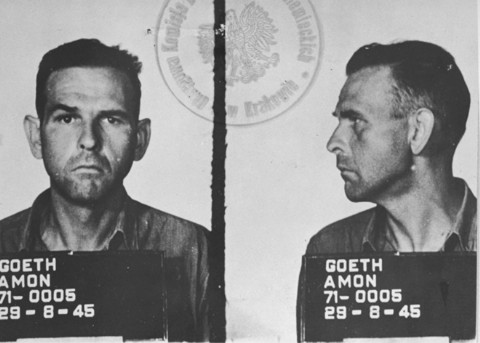 Amon Goeth's prison
mug shots
Amon Goeth's prison
mug shots
At Goeth's trial, the Nazi party was said to be "an organization which, under the leadership of Adolf Hitler, through aggressive wars, violence and other crimes, aimed at world domination and establishment of the National-Socialist regime." Amon Goeth was accused of personally issuing orders to deprive people of freedom, to ill-treat and exterminate individuals and whole groups of people. His crimes, including the newly created crime of genocide, came under a new law of the Allies, called Crimes against Humanity.
The charges against Amon Goeth were as
follows:
(1) The accused as commandant of the
forced labour camp at Plaszow (Cracow) from 11th February, 1943,
till 13th September, 1944, caused the death of about 8,000 inmates
by ordering a large number of them to be exterminated.
(2) As a SS-Sturmführer the accused
carried out on behalf of SS-Sturmbannführer Willi Haase
the final closing down of the Cracow ghetto. This liquidation
action which began on 13th March, 1943, deprived of freedom about
10,000 people who had been interned in the camp of Plaszow, and
caused the death of about 2,000.
(3) As a SS-Hauptsturmführer the
accused carried out on 3rd September, 1943, the closing down
of the Tarnow ghetto. As a result of this action an unknown number
of people perished, having been killed on the spot in Tarnow;
others died through asphyxiation during transport by rail or
were exterminated in other camps, in particular at Auschwitz.
(4) Between September, 1943, and 3rd
February, 1944, the accused closed down the forced labour camp
at Szebnie near Jaslo by ordering the inmates to be murdered
on the spot or deported to other camps, thus causing the death
of several thousand persons.
(5) Simultaneously with the activities
described under (1) to (4) the accused deprived the inmates of
valuables, gold and money deposited by them, and appropriated
those things. He also stole clothing, furniture and other movable
property belonging to displaced or interned people, and sent
them to Germany. The value of stolen goods and in particular
of valuables reached many million zlotys at the rate of exchange
in force at the time.
The last charge, as stated in number
(5) above, was the crime for which he had been arrested by the
Gestapo on September 13, 1944, after an investigation by Waffen-SS
officer Dr. Georg Konrad Morgen.
At his trial, Goeth's defense was that
he was a Waffen-SS soldier who had to follow the orders of his
superiors. He denied killing anyone except when ordered to carry
out an execution. You can read the full text of the transcript
of the trial of Amon Leopold Goeth here.
The photograph below shows Amon Goeth
as he was escorted from the courtroom after being sentenced to
death. At 6 foot 4 inches tall, Goeth towered over his Polish
guards.
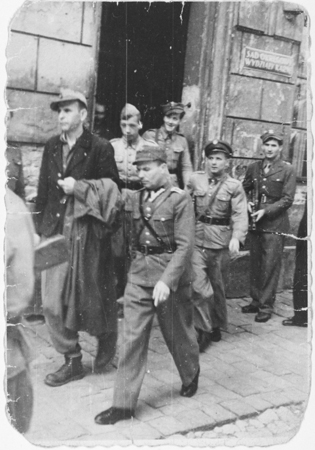
Amon Goeth leaves courthouse
after being sentenced to death
Amon Goeth was found guilty on all counts. He was hanged in Krakow on September 13, 1946, exactly two years to the day that he left the Plaszow camp after being arrested. His body was cremated and his ashes were thrown into the Weichsel river. His name will forever be associated with the total disregard for human life, as exemplified by the fictional scenes in Schindler's List when Goeth shoots Jewish prisoners at random from the balcony of his home.
This page was last updated on July 17, 2012
|